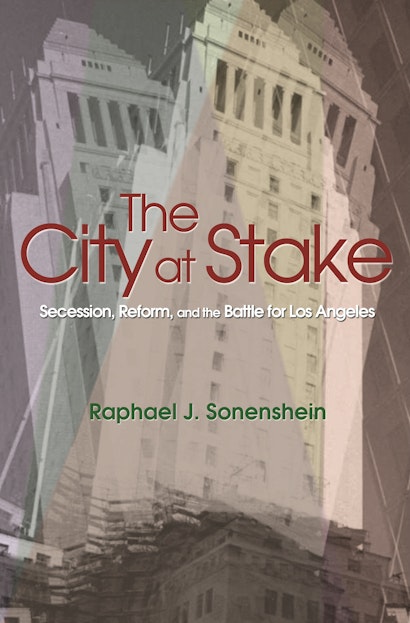The City at Stake tells the dramatic story of how the nation’s second-largest city completed a major reform of its government in the face of a deeply threatening movement for secession by the San Fernando Valley. How did Los Angeles, a diverse city with an image of unstructured politics and fragmented government, find a way to unify itself around a controversial set of reforms?
Los Angeles government nearly collapsed in political bickering over charter reform, which generated the remarkable phenomenon of two competing charter reform commissions. Out of this nearly impossible tangle, reformers managed to knit a new city charter that greatly expanded institutions for citizen participation and addressed long-standing weaknesses in the role of the mayor. The new charter, pursued by a Republican mayor, won its greatest support from liberal whites who had long favored reform measures.
Written by an urban scholar who played a key role in the charter reform process, the book offers both a theoretical perspective on the process of institutional reform in an age of diversity, and a firsthand, inside-the-box look at how major reform works.
The new afterword by the author analyzes the 2005 election of Los Angeles’s first modern Latino mayor, Antonio Villaraigosa, a milestone in the development of urban reform coalitions in an age of immigration and ethnic diversity.
Raphael J. Sonenshein is Professor of Political Science at California State University, Fullerton, and the author of Politics in Black and White: Race and Power in Los Angeles (Princeton). Between 1997 and 1999, he served as Executive Director of the City of Los Angeles Charter Reform Commission.
"Los Angeles owes much to Raphael J. Sonenshein, a pioneering scholar of this city whose serious study has spurred interest in its dense, subtle politics and government. . . . The . . . professor's book . . . chronicles with precision the events of the mid- to late-1990s, as Los Angeles debated its future in the context of a complicated overhauling of its city charter. And Sonenshein writes not just as an observer but also as a participant: He served as executive director of one of two charter commissions that led that ambitious and difficult reform effort."—Jim Newton, Los Angeles Times
"This is a thorough survey of the intricacies of politics in a city long reputed to lack coherent political organization and governance. It further shows how constructive coalitions can be built across ethnic and cultural lines by civic entrepreneurs and produce beneficial reforms."—Choice
"Sonenshein's detailed and empirical study is a useful and refreshing antidote, and when paired alongside his 1993 book, Politics in Black and White, serves as the definitive account of the city's political history since the 1970s. . . . Sonenshein's careful study of political power in Los Angeles reminds us of the importance of urban leadership in the shaping of cities, and of the likelihood that Los Angeles politics will be increasingly dynamic and unpredictable in the future."—Richard M. Flanagan, Perspectives on Politics
"Not only does this book examine an important political shift in the nation's second largest city, but it also serves as a quasi-memoir, as the author was at the center of the debate as it was taking place."—Journal of Urban Affairs
"A lively, detailed, yet academic book. I imagine reading it would prove instructive for all those involved in or concerned with public administration and public policy, particularly at the municipal level—and particularly in terms of building coalitions."—David Hodgkinson, Law Society Journal
"An absorbing insider's account of the maneuvering among elites in a major American city in the process of redefining itself politically. Sonenshein's analysis of behind-the-scenes politicking is virtually unmatched in the urban politics literature."—Michael Jones-Correa, Cornell University
"The author does a good job of combining his personal notes with newspaper articles and interviews to tell a complete story of charter reform. This should be an important contribution to the urban politics literature."—Bruce Cain, University of California, Berkeley

